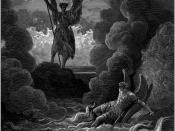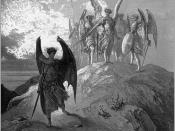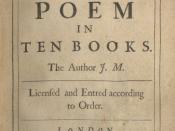Upon reading Mary Shelly's "Frankenstein" and John Milton's "Paradise Lost," an obvious correlation sticks out between the two novels. However, after the obvious "Paradise Lost" reference in "Frankenstein," how much do the stories resemble each other? The correlation doesn't jump out in each novel, but it is definitely alive in the characters and meanings of each book.
It is unclear whether "Frankenstein" it is an endorsement or criticism of "Paradise Lost," but it is clearly an answer to Milton's novel, with its own modifications of some of Miltons's most prominent characters. It seems that the greatest achievement made by "Frankenstein" is that Shelly finally gave a face to Milton's God, Satan, and humans in her novel.
"Frankenstein" is the tale of a creator and his opposition with his creation. The relationship between the created and creator is what sets the two novels apart. Unlike God creating Adam, loving him and nurturing him; Victor creates a hideous creature that he has no love for and detests.
Could Shelly be endorsing that man didn't come out to God's expectations?
The power of god is placed upon Victor just as it was placed the hands of Adam. He describes his powers as if they were given to him by God, when he states, "When I found so astonishing a power placed in my hands, I hesitated a long time concerning the manner in which I should employ it" (Shelly 35). Victor could create life, just as Adam was the only male, and was the only source of future life for mankind. Victor is aspiring to be God-like; he is giving life to something that was once nothing.
In "Paradise Lost," Satan emerges as the main character; with his actions and speeches taking up a great deal of the novel. Subsequently in "Frankenstein",


